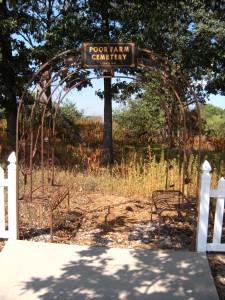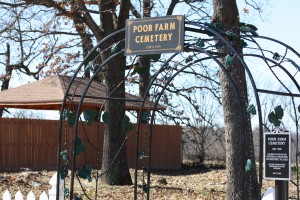It’s part of the human condition — to have at least of modicum of fear of being alone and forgotten; but in reality, there are but a few who are truly and completely forgotten, especially in this digital era – where we are always “on” and accessible whether we want to be or not.
Yet the “Poor Man’s” Cemetery in historic Bentonville, AR bears witness to the fact that a century and a half ago there were a group of people who were utterly alone, save for the benevolence of an Ozark citizen who took in those who no longer had a connection to this world, even before they passed from it.
The Benton County “Poor Farm” was established in 1850; the cemetery was laid out during the Civil War and remained active during the Reconstruction era — downtown Bentonville had been burned by Union soldiers, and the town began to re-establish itself during the reunification of the United States.
Those who “qualified” to live on the farm were sold, with the understanding that they would work on the Farm for at least a year.
Below is an 1880 list of some of the residents who made their home there, along with an assortment of politically incorrect reasons for their presence:
Residents of the Benton County Poor Farm in 1880:
• Permelia Morse, 74, widow, crippled
• Sylvania Lee, 67, married woman, dropsy
• Lucy Younger, 59, single woman, crippled
• Matilda Ferguson, 55, single woman, old age
• James Barnes, 79, married man, old age
• William Bryson, 72, married man, old age and blind
• Archibald Whinery, 49, single man, paralysis
• William Brownhill, 21, single man, idiotic
• Margaret Robins, 16, single girl, idiotic
• Margarett Garrett, 59, widow, insane
• Eli Suter, 38, single man, insane
• William Dwyer, 59, married man, insane
Sadly, for over 100 years, the cemetery was neglected. As shown in the photograph below, weeds covered the modest, unmarked gravestones, the only reminder of a time when life was relentlessly unkind to those who were seen as unfit:

Poor Farm Sign
But fortunately, we Ozark Treasure Hunters discovered that the area was recently cleaned up in July of 2013 — it seems only fitting to treat the long ago disenfranchised with the dignity and respect that eluded them in life:
